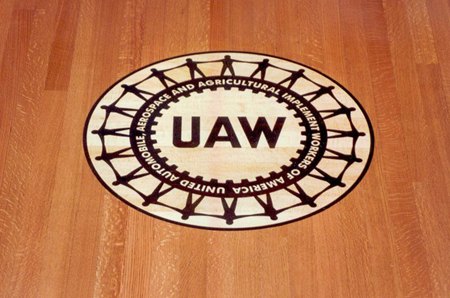The United Auto Workers, Ford, GM and Chryslerberus Ante Up
The poker game known as the United Auto Workers' (UAW) contract negotiations officially begins on July 23rd. To hear the main participants, the cards have already been dealt. Ford and GM claim they're bust, or about to go bust. They say there's only way they can get back in the game: the UAW has to share some of the chips they stole won from their tablemates. The UAW is saying yeah right sure. Shut up and play. And Chryslerberus just sits at the table, wearing dark shades, saying nothing.
The stakes couldn't be higher. While much of the media conjecture leading up to the negotiations has centered on health care costs that make the word stratospheric seem pedestrian, there are other points that'll require agreement: plant closures, the infamous (and still unspecified) jobs bank, temporary hires and more.
Setting the tone for the upcoming negotiations, UAW President Ron Gettelfinger "strongly disagrees that we are part of the problem in the auto industry." He also declared that he considers reports that American auto companies "need" a $30 reduction in hourly wages and benefits as "nothing more than posturing." The UAW boss pooh-poohs this "supposed" gap between Detroit's union and the transplants' labor costs.
Meanwhile, The Detroit News reports that "sources inside Ford" state that unless the UAW agrees to lower their workers' $71 per hour wages and benefits down to $50 per hour, The Glass House Gang will go out of business. And the Wall Street Journal quoted "an unnamed Detroit executive" saying the domestics will move production overseas if the UAW doesn't help them compete with their ascendant competition.
Again, the battle lines are drawn, even before the game begins. Once they start, interested parties (and who isn't?) will have eight weeks to hammer out a new agreement before the old contract expires. And if they can't?
During a Q&A session with UAW members, a worker asked his president if a strike is an "option in the national negotiation." Gettelfinger responded with a simple "yes." In his address to the UAW Bargaining Convention in March, Gettelfinger stated the union would fight at the bargaining table and "if need be on the picket line" to protect their standard of living. In January, the union reported that their strike fund totaled $900m.
Would the UAW be stupid determined enough to launch a strike against GM or Ford? As noted in our Deathwatch series, both automakers' finances are in a precarious position (i.e. mortgaged up to their eyeballs). The UAW's 47-day strike against GM in 1998 reportedly cost the automaker $1.6b– roughly $34m a day. Given The General's and Ford's current cash reserves, a drain of that size or duration would have disastrous financial consequences.
If a strike stretched into months, it would force either– or both– automakers into Chapter 11. While bankruptcy doesn't automatically void the UAW's contracts, it certainly wouldn't help their bargaining position.
Back when Detroit owned the domestic auto market, the UAW called the shots. Now, the automakers are saddled with expenses they can't afford: high wages, the job bank, "cradle to grave" health care benefits and restrictive working practices. The golden days of huge union membership, enormous dues and unbridled power are gone.
In spite of the posturing, Gettelfinger knows someone has to give. He's already stated that the union's now willing to give Chrysler the same "concessions" they allowed Ford and GM in 2005. But will the UAW really be willing to surrender anything substantive?
That depends entirely on how you define the word "substantive." There's a high likelihood there will be some kind of deal on retiree health care provision. The most likely scenario: The Big 2.8 will divest themselves of retiree health care liabilities through a UAW-run VEBA similar to the health care deal and the recent agreement with Goodyear (i.e. they'll pay them now so they don't have to play them quite as much later).
You can also bank on the jobs bank cashing out– slowly. The automakers will want to kill it dead. But the UAW will negotiate a grandfather clause for current employees. In other words, old employees will live out their lives of leisure while new employees will not enjoy the protection of having a non-job job waiting for them when if their services be excess to requirements.
Temporary employees will be another hot topic. The Big 2.8 will want to use temps whenever and wherever they see fit, even in traditionally unionized jobs. The UAW will demand restrictions on their use or, at the least, require union dues. The union will concede on many job classifications. In return, they'll get their money.
Should the UAW and their employers reach an agreement, it's important to remember that there are– and always have been– suckers at the table. Truth be told, both the union and management are playing with someone else's money. Once upon a time, it was the American consumer's cash. Now it's the automakers' shareholders and union workers funding the game. No matter what happens, they're both bound to lose their shirts.
More by Frank Williams
Latest Car Reviews
Read moreLatest Product Reviews
Read moreRecent Comments
- Jkross22 Not to rub salt in the wound, but why would you put your hq in some extraordinarily expensive real estate like Manhattan Beach? I know little of Fisker the person, but this reeks of ego and the desire for appearances.
- 3-On-The-Tree I’ve responded to several bike accidents where if the guy wasn’t wearing a helmet he would’ve been in a casket. Plus it saves your hearing.
- Wjtinfwb Nice cars and a find if you're into Radwood type iron. But a near 40 year old anything, even something as robust as a Legend is going to have failure points that would be prohibitively expensive to fix. Electronics, A/C, leaky old gaskets, creaking suspension bushing etc., not to mention the lack of safety gear and an interior that no doubt has "seen a lot". I applaud the manual transmission, but you could likely find something 30 years newer for not much more money to hone your heel and toe skills on before graduating to a more expensive ride.
- ScarecrowRepair Considering how over-priced Apple products are, I doubt a cheap Rivian is in the works.
- Dick Mottram What happens when you are on slippery pavement and AEB slams on the brakes. I see it causing many accidents in the winter!

































Comments
Join the conversation